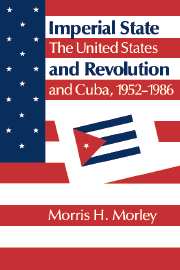Book contents
- Frontmatter
- Contents
- Acknowledgments
- 1 The U.S. imperial state: theory and historical setting
- 2 The United States in Cuba 1952–1958: policymaking and capitalist interests
- 3 The United States in Cuba 1959–1961: national-social revolution, state transformation, and the limits of imperial power
- 4 The United States against Cuba 1961-1968: politics of confrontation in Latin America
- 5 The United States against Cuba 1961–1968: politics of global economic blockade
- 6 The United States against Cuba 1968–1980: intransigent policymaking and its consequences
- 7 The U.S. imperial state: some final insights
- Epilogue. The Reagan administration and Cuba: the revival of vendetta politics 1981–1986
- Appendix 1 The impact and effectiveness of the U.S. global economic blockade on Cuban development
- Appendix 2 Tables
- Notes
- Bibliography
- Index
6 - The United States against Cuba 1968–1980: intransigent policymaking and its consequences
Published online by Cambridge University Press: 04 May 2010
- Frontmatter
- Contents
- Acknowledgments
- 1 The U.S. imperial state: theory and historical setting
- 2 The United States in Cuba 1952–1958: policymaking and capitalist interests
- 3 The United States in Cuba 1959–1961: national-social revolution, state transformation, and the limits of imperial power
- 4 The United States against Cuba 1961-1968: politics of confrontation in Latin America
- 5 The United States against Cuba 1961–1968: politics of global economic blockade
- 6 The United States against Cuba 1968–1980: intransigent policymaking and its consequences
- 7 The U.S. imperial state: some final insights
- Epilogue. The Reagan administration and Cuba: the revival of vendetta politics 1981–1986
- Appendix 1 The impact and effectiveness of the U.S. global economic blockade on Cuban development
- Appendix 2 Tables
- Notes
- Bibliography
- Index
Summary
The global and regional context
In the first two decades after World War II when the United States was the dominant capitalist economic and military power, Republican and Democratic administrations promoted an essentially bipartisan foreign policy that enjoyed widespread domestic political support. They could count on an effective and unified military apparatus and a high degree of cooperation from allies in Western Europe, Japan, Canada, and the Third World. During the late 1960s and 1970s, however, the problem for American policymakers was how to resolve challenges emanating from all these sources, including challenges resulting from America's engagement in Indochina.
The enormous cost of the Vietnam involvement combined with growing economic losses to Western Europe and Japan weakened the hegemonic position of the United States in the capitalist world economy. Between 1967 and 1974, for example, West German and Japanese direct investment abroad grew at an average annual rate almost triple that of American multinationals. Moreover, trade competition from the same countries during the 1960s and 1970s lowered the U.S. portion of markets in Western Europe and Latin America and led to both an absolute and a relative decline in the percentage of global manufactured exports of American origin. Within the military sphere, Washington had to accept the reality of Soviet nuclear and conventional arms parity and cope with the decline in institutional solidarity and esprit de corps inside the U.S. armed forces. Domestically, Vietnam meant that administrations could no longer automatically count on unified public support for foreign-policy initiatives, thereby weakening the U.S. capacity to militarily intervene in the affairs of other countries.
- Type
- Chapter
- Information
- Imperial State and RevolutionThe United States and Cuba, 1952–1986, pp. 240 - 300Publisher: Cambridge University PressPrint publication year: 1988



